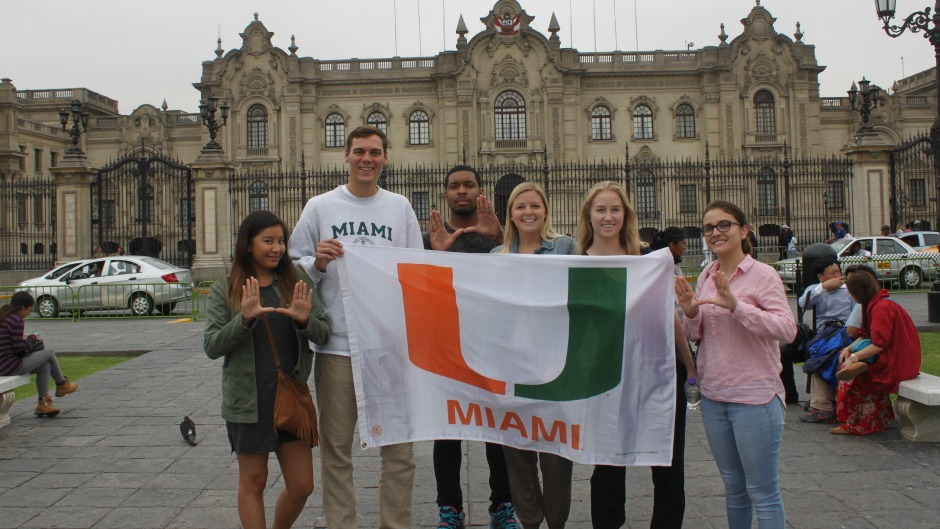Kingma, up on the mountain with 14 other undergraduate students from the School of Business to consult with Peruvian micro-enterprises with a social mission, had a realization. “Seeing the physical divide between the two income classes was really powerful,” Kingma says. “It showed the problems in the country with being able to scale the social ladder, and we saw that the work we were doing to help these people climb that social ladder is really needed.”
The students, half from the school’s Hyperion Council (an undergraduate honor and service organization) and half from a pilot class on social entrepreneurship (called Scaling the Social Enterprise), were consulting for micro and small scale enterprises tackling significant social issues in Peruvian society. Their assignment: help them figure out how to grow or scale. The students had already spent the spring semester brainstorming ideas to help their assigned business clients, and then made the one-week journey to Peru in mid-May to conduct in-country research and present their recommendations.
“They get to apply what they’re learning in the classroom in a real way and take advantage of an international travel experience that produces new post-academic experiences,” says EllenMarie McPhillip, assistant dean of undergraduate business education. “It was extra-special because the Hyperion Council has never had the opportunity to work with a class in its social enterprise activities. This was really a unique way to be mentored by faculty in a formal way.”
While one Hyperion Council team introduced the concept of crowdfunding to an organization creating a library for impoverished children, Kingma and his team from the Hyperion Council worked with Spray Wash, a company that uses a novel solution to wash cars with very little water, then donates profits to a water bottling company. That company, in turn, distributes clean water to those who need it most. There are 8 million people in the area without access to clean water.
Though Kingma’s group spent the semester drawing up a marketing plan after a Skype meeting with Spray Wash’s founders, once they arrived in Peru, they quickly realized that the company had more urgent needs. “They needed a sustainable financial model, a business plan, everything under the sun,” McPhillip says. “Our students did some in-country surveys to see whether they were targeting the right market, and they revamped their pricing structure. They showed them an alternative way to create some different revenue streams so they could be more efficient.”
Kingma and his teammates plan to follow up with Spray Wash on Skype – and possibly even make another trip to Peru. “I learned more about the real issues that business face,” said Kingma, a finance and economics major. “Creating a financial model taught me how to go about solving specific problems. I also learned about giving a consulting pitch to a company without being too direct, but also using our skills to really assist them.”
One significant benefit of joining up with the business class students, Kingma said, is that as a bigger group, they could better experience Lima. “We had one of the coolest dinners of my life!” Kingma said. “We went to a restaurant on the ruins of one of the Incan pyramids and had a three-course meal with very traditional Peruvian food. We also took a formal tour of the city.”
The students from “Scaling the Social Enterprise,” meanwhile, split into two groups. One worked with women who were trying to launch an organic soup company, and the other partnered with Mujer Valiente, an organization aiming to create safe spaces for abused women. In the classroom, they discussed articles outlining different examples of social entrepreneurship and the theories behind the companies. In their groups, they Skyped with the business leaders in Peru and gave updates to the others in class.
Management major Brianna Antonella Valdivia, a senior who was born in Miami but has Peruvian roots, was project leader of the group assigned to Mujer Valiente. The company was already selling mugs and bags emblazoned with female empowerment messages and donating profits to larger organizations helping abused women. The team convinced Mujer Valiente to instead sell luxury purses made by abused women, primarily to U.S. consumers, through online channels. The team even designed a prototype purse, which would carry a tag showcasing the story of the brave woman who made it. “We created an entire business model for them to become an established NGO [non-governmental organization) in the community and a five-year to 10-year plan of how they can grow their company and take the cause worldwide,” Valdivia says. “We turned their huge overarching goal for the company into a feasible action plan, and they were so happy and proud of our group. That was the high point, to be able to apply my education here at the University of Miami to real-life circumstances in places like Lima.”
Robert Hacker, the instructor for the class, couldn’t be more pleased with how the semester and the week abroad unfolded. “They formed hypotheses in the classroom in Miami, and when they got there, they did fact-finding and realized their hypotheses had to be modified,” Hacker says. “That’s a high-quality learning experience, and in a place like Peru, there’s definitely a shortage of consultants to social organizations, so the students were filling a market need.”
Valdivia, for her part, not only has solidified her desire to work after graduation with college students pursuing social justice careers – she also has an A on her report card to show for it.
